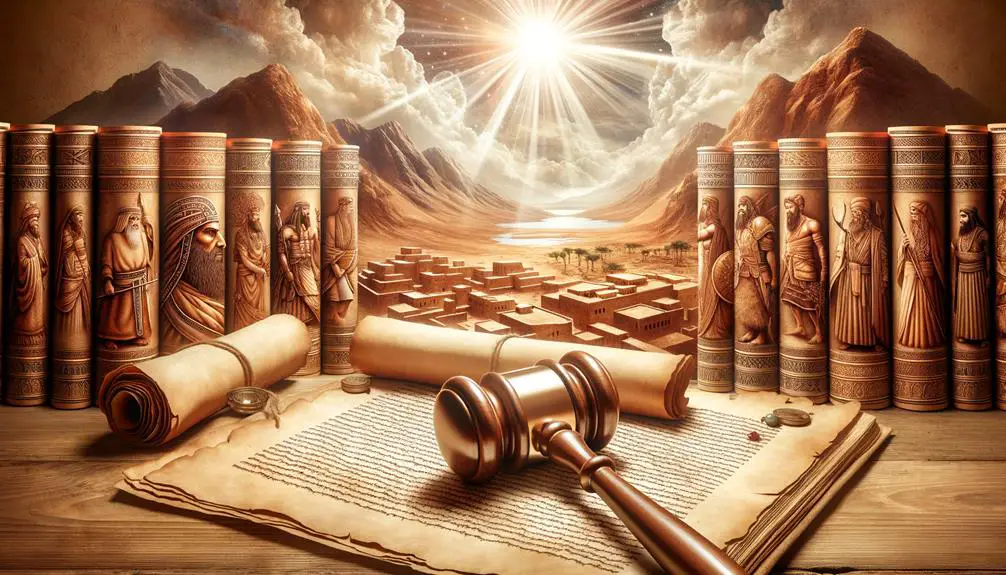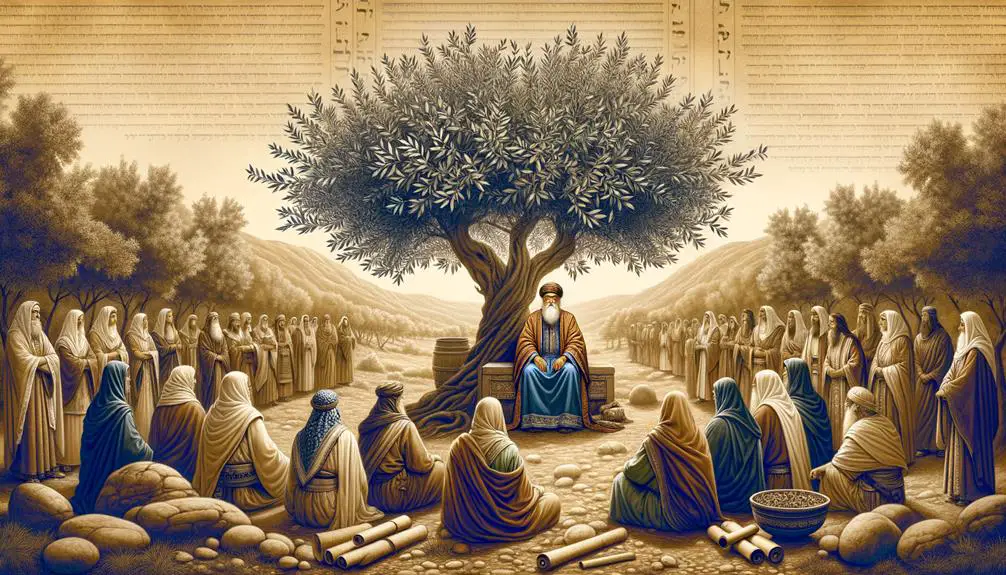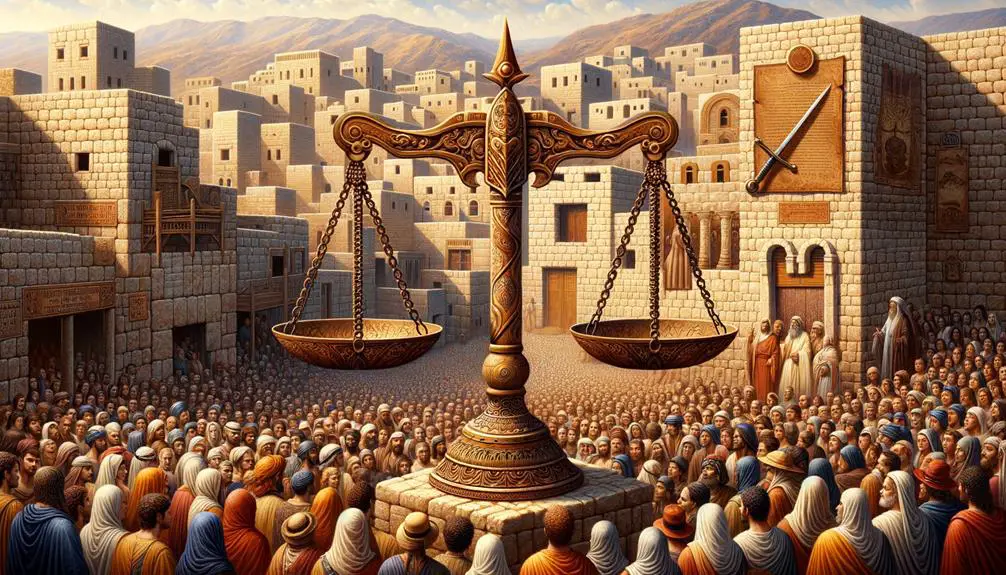Fierce and divinely chosen, the biblical judges were more than arbiters of justice; they were saviors in tumultuous times, leading with faith and bravery.

What Were the Judges in the Bible
In a time when chaos reigned supreme and lawlessness was the order of the day, the judges in the Bible stood as towering figures of justice amidst a sea of turmoil. You've probably heard their names, like Deborah, Gideon, and Samson, but do you truly understand their roles?
These weren't your typical courtroom judges, donning robes and wielding gavels. Instead, they were divinely appointed leaders who delivered the Israelites from their oppressors and guided them through dark times. Uncover the layers behind these extraordinary characters and what their stories can teach us about leadership, faith, and redemption.
The journey through their lives offers a unique glimpse into a pivotal era that shaped a nation.
Key Takeaways
- Judges were leaders who provided military, spiritual, and legal guidance during Israel's pre-monarchical era.
- They played a crucial role in unifying tribes and restoring order in times of chaos and lawlessness.
- The era of Judges was marked by a cyclic pattern of sin, oppression, repentance, and deliverance, demonstrating divine mercy and justice.
- Notable judges like Deborah, Samson, and Gideon highlight the diverse leadership styles and challenges faced in maintaining Israelite identity and faith.
The Historical Context

In analyzing the historical context of the Judges in the Bible, it's crucial to recognize that this period bridges the gap between the Israelites' conquest of Canaan and the establishment of the monarchy, reflecting a time of decentralized tribal leadership. This era is marked by significant geopolitical influences, as the Israelites navigated relationships with surrounding nations and tribes. These interactions weren't merely confrontational; they also led to cultural assimilation, as the Israelites adopted some of the practices and customs of the Canaanite population, blending their own traditions with those of the indigenous people.
The geopolitical landscape of the time was complex, characterized by a patchwork of city-states and territories, each with its own ruler. This fragmentation made the region susceptible to external influences, both from major powers like Egypt and from smaller, neighboring entities. The Israelites, without a centralized government, had to rely on the leadership of the judges, who weren't only military leaders but also arbiters of disputes and keepers of the faith. This decentralized system was influenced by the need to navigate the geopolitical realities of the time, requiring alliances, and sometimes confrontations, with neighboring groups.
Cultural assimilation played a significant role in shaping the identity of the Israelites during this period. As they settled in Canaan, the blending of cultures was inevitable. This included adopting agricultural practices, adapting to local customs, and in some cases, syncretizing religious practices. This period of cultural exchange and adaptation was crucial in the development of Israelite society, setting the stage for the emergence of a unified monarchy.
The Role of Judges
Building on the understanding of the Israelites' cultural and geopolitical landscape, it's crucial to examine the judges' multifaceted roles as both leaders and mediators in this era. The judges wielded significant judicial authority, which was instrumental in maintaining social order and upholding the law. Their legal functions extended beyond merely settling disputes; they were pivotal in guiding the Israelites through periods of moral and spiritual crisis. This analysis aims to dissect the intricate role of judges, focusing on their judicial authority and legal functions.
- Military Leadership: Judges often assumed the role of military leaders, rallying tribes against common enemies. Their authority wasn't limited to the courtroom; it extended to the battlefield, where they directed military strategies and led the Israelites to significant victories.
- Legal Adjudication: At the core of their role, judges performed legal functions, interpreting and applying the law to resolve disputes. They functioned without a formal legal framework, relying on wisdom and divine guidance to administer justice.
- Spiritual Guidance: Besides their judicial and military responsibilities, judges also served as spiritual leaders. They reminded the Israelites of their covenant with God, steering them back to their faith during times of idolatry and moral decline.
- Political Mediation: Judges played a crucial role in mediating between conflicting tribes, maintaining unity among the Israelites. Their ability to navigate complex political landscapes was essential for the cohesion and stability of the tribal confederation.
In essence, the judges' roles were deeply intertwined with the Israelites' survival and identity. Their judicial authority and legal functions underscored their importance in this critical period of history.
Notable Judges and Their Stories

Delving into the stories of notable judges reveals their pivotal roles in shaping the Israelite's history and culture, as these figures not only administered justice but also led their people through periods of turmoil and victory. Their narratives, rich in military strategies and character flaws, provide a nuanced understanding of leadership and morality.
Take, for instance, Deborah, the only female judge, who stands out for her wisdom and courage. She orchestrated a victory over the Canaanites through strategic alliances, exemplifying how leadership transcends gender norms. Her story underscores the significance of tactical acumen in overcoming formidable adversaries.
Contrastingly, Samson's tale is a study of how personal weaknesses can undermine even the strongest leaders. Despite his supernatural strength, his character flaws, particularly his recklessness and vulnerability to manipulation, led to his downfall. Samson's narrative serves as a cautionary tale about the perils of failing to heed wisdom and self-discipline.
Gideon's story highlights the importance of strategic ingenuity and faith. Hesitant at first, he led a small force to a miraculous victory over the Midianites, demonstrating that effective leadership often requires unconventional thinking and a deep trust in one's convictions.
Each judge's story, with its unique blend of triumphs and failures, offers insights into the complex dynamics of leadership. Their military strategies and personal shortcomings illustrate the multifaceted challenges they faced. These narratives not only enrich our understanding of biblical history but also offer timeless lessons on the human condition and the qualities necessary for effective leadership.
The Cycle of Sin and Deliverance
While exploring the notable judges' leadership and moral lessons, it's essential to understand the recurrent theme of sin and deliverance that defines the broader narrative of the Israelites. This cycle, marked by sinful repetition and deliverance patterns, showcases a dynamic interplay between human frailty and divine mercy.
Here's a breakdown:
- Sinful Repetition: The Israelites frequently fall into a pattern of sin, often forsaking Yahweh to worship other gods. This behavior reflects a deeper moral and spiritual crisis, indicating a forgetfulness of their covenant with God and His laws.
- Divine Wrath: As a consequence of their actions, God allows their enemies to conquer or oppress them. This period of suffering serves as a wake-up call, reminding the Israelites of their reliance on God's protection and blessings.
- Repentance and Supplication: Realizing their mistakes, the Israelites repent and cry out to God for deliverance. This step is crucial as it signifies a recognition of their wrongdoing and a desire to return to the right path.
- Raising of a Judge: In response, God raises a judge to deliver Israel from its oppressors. This judge not only leads the people to military victory but also attempts to guide them back to faithfulness to God. Each judge's story serves as a testament to God's willingness to rescue His people, despite their flaws.
Understanding these deliverance patterns offers insight into the complex relationship between God and the Israelites, highlighting themes of mercy, justice, and the consequences of human actions.
Judges' Impact on Israelite Society

You'll observe that the judges played a pivotal role in restoring social order within Israelite society, often during times of chaos and moral decline.
Their leadership not only varied in methods but also in the backgrounds from which they hailed, introducing a diversity that had significant implications.
This variety and their actions had a profound impact on the social and political landscape of the time.
Social Order Restoration
Restoring social order, the Judges in ancient Israel played a crucial role in stabilizing and guiding the society through periods of moral and political turmoil. Their actions offer modern parallels in understanding societal dynamics, where leadership is pivotal in times of crisis. Analyzing their impact reveals:
- They mediated conflicts, ensuring community cohesion and justice.
- Their decisions often led to periods of peace, allowing for societal growth and development.
- By upholding laws and moral codes, they reinforced the societal structure and norms.
- Their leadership exemplified the importance of accountability and guidance in maintaining social order.
These facets underline the Judges' significance in not only resolving immediate crises but also in laying the groundwork for sustained societal stability and prosperity.
Leadership Diversity
Exploring the Judges' impact on ancient Israelite society reveals a striking diversity in leadership styles and approaches, reflecting a multifaceted approach to governance and social cohesion. This diversity underscored the adaptability of Israelite leadership in response to the evolving needs of their society, from military conquests to legal disputes.
The variation in leadership also challenged and reshaped gender roles, with figures like Deborah breaking traditional expectations to serve as a judge and military leader. Such instances not only highlight the fluidity of gender roles but also point to the broader cultural dynamics at play within Israelite society.
These dynamics facilitated a rich tapestry of leadership that, despite its diversity, aimed at unifying and guiding the community through its formative years.
Lessons From the Judges Era
You observe that the Judges era teaches critical lessons on leadership amidst chaos and sustaining faith during hardship. These narratives illustrate how leaders emerged to guide the Israelites through tumultuous times, underscoring the importance of resilience and adaptability.
Furthermore, the stories reveal the profound impact of maintaining faith in the face of adversity, offering timeless insights for contemporary leadership and spiritual practice.
Leadership Amidst Chaos
The era of the Judges in ancient Israel offers profound insights into leadership dynamics during times of societal upheaval and moral ambiguity. During this period, leaders emerged who exemplified crisis management and navigated chaotic leadership with varying degrees of success. Here are four key lessons:
- Adaptability: Leaders must swiftly adapt to changing circumstances without losing sight of their core principles.
- Decisiveness: In chaos, decisive action can stabilize and provide direction.
- Communication: Clear, honest communication fosters trust and unity among people facing uncertainty.
- Moral Courage: Upholding justice and righteousness, even when unpopular or dangerous, is crucial for lasting leadership impact.
These elements are fundamental in leading effectively amidst turmoil, offering timeless guidance for managing crises and leading with integrity.
Faith During Hardship
In the Judges era, individuals often found their faith tested to the utmost during periods of significant hardship and distress. This era serves as a profound template for understanding how spiritual perseverance and modern resilience can be cultivated.
Judges Era Challenge |
Lesson for Modern Resilience |
|---|---|
External oppression |
Stand firm in your beliefs |
Internal strife |
Unity is strength |
Moral corruption |
Integrity is paramount |
Spiritual apathy |
Rekindle faith constantly |
Leadership vacuums |
Step up when needed |
The narratives from this period demonstrate that despite overwhelming adversity, maintaining one's faith and spiritual integrity was possible and crucial. These stories aren't just historical accounts; they're timeless lessons on how to endure, persevere, and emerge stronger in the face of hardship.
Frequently Asked Questions
How Did the Selection Process for Judges Differ From Contemporary Judicial Appointments?
In contemporary judicial appointments, you'll find a structured nomination and confirmation process, often involving political and legal scrutiny. However, the selection of judges in ancient times relied heavily on divine guidance and tribal leadership.
Instead of vetting through a formal system, individuals were chosen based on perceived spiritual calling and leadership qualities. This starkly contrasts with today's methodical approach, highlighting the evolution of judicial selection processes over millennia.
Were There Any Female Judges, and What Challenges Did They Face in a Predominantly Male Role?
Yes, there were female judges, notably Deborah. In her role, she demonstrated key leadership traits such as wisdom and courage.
However, she faced significant challenges due to prevailing social perceptions of gender roles. Being a woman in a predominantly male role, Deborah had to navigate skepticism and doubt from those who questioned her leadership capabilities.
Her story highlights the complexities of breaking gender norms in leadership positions.
How Did the Concept of Justice as Executed by the Biblical Judges Compare to Modern Legal Systems?
You'll find that in the biblical times, justice wasn't about cold, hard statistics; rather, it was deeply intertwined with Divine Intervention and Moral Judgments.
Unlike modern legal systems that rely on a body of law and evidence, biblical judges made decisions often guided by divine insights.
This approach, focusing more on moral and spiritual dimensions than on empirical evidence, starkly contrasts with today's systems, where the law and procedural fairness take the forefront.
In What Ways Did the Judges Interact With or Influence the Neighboring Nations and Their Leaders?
In your study, you'll find that the judges played pivotal roles in shaping military strategies and diplomatic relations with neighboring nations. They didn't just lead their own people; they also engaged with foreign leaders, influencing the geopolitical landscape.
This involvement varied, from direct military interventions to subtle diplomatic negotiations, aiming to protect their nation's interests while navigating the complex web of regional politics.
Their actions had lasting impacts on the ancient Near Eastern power dynamics.
How Has Archaeological Evidence Supported or Contradicted the Biblical Accounts of the Judges?
Diving into the ocean of history, you find archaeological methodologies challenging yet illuminating. These techniques have both supported and contradicted the biblical accounts of the Judges, weaving a complex tapestry of their authenticity.
Conclusion
In analyzing the era of the Judges, you've journeyed through a historical tempest, witnessing the cyclical storms of sin and deliverance that shaped Israelite society.
These leaders, more than mere warriors or arbiters, were the moral compasses in times of disarray. Their stories, rich with lessons, underscore the complex interplay between divine guidance and human agency.
As the lighthouse guiding ships through treacherous waters, the Judges era illuminates the enduring impact of faith, leadership, and redemption on collective identity.



Sign up